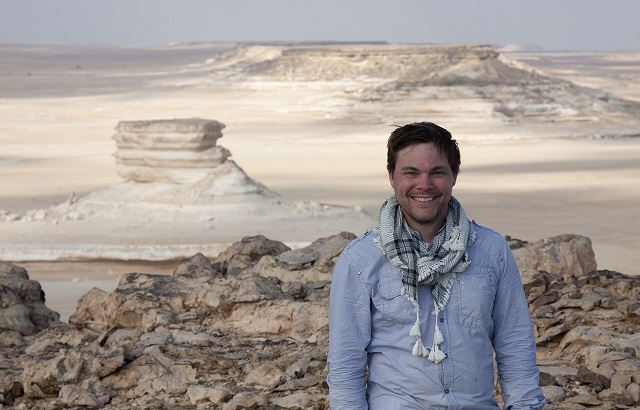Pioneering AI in Earth Sciences: DERI’s Professor Cédric John
Professor John leads Data Science for the Environment and Sustainability at the Digital Environmental Research Institute (DERI).

Taking some rest in the desert of South Central Oman, Wadi Jarah (2011)
This Earth Day, meet Professor John, who leads a team applying artificial intelligence (AI) to geoscience and sustainability challenges. As Professor and Head of Data Science for the Environment and Sustainability, he will spearhead DERI’s work to develop and deploy AI-driven approaches to address environment-related challenges, with the ultimate goal of achieving a sustainable equilibrium between human activity and the environment.
Professor John brings a wealth of experience in applying machine learning and AI to geosciences and environmental research. His work has taken him from the trenches of fieldwork to the cutting edge of AI. He will deliver an inaugural lecture titled "Data-Driven Earth Sciences: My Journey from Fieldwork to Artificial Intelligence" on April 30th. It promises a fascinating glimpse into Professor John's remarkable career path and the exciting future of AI in environmental research.
.jpg)
“I am thrilled to be joining DERI at a time when data science is playing an increasingly important role in understanding and addressing environmental challenges,” said Professor John. "Data science is rapidly transforming our understanding of Earth's systems. By leveraging AI, we can develop powerful solutions to safeguard our environment and achieve a sustainable future."
Professor Greg Slabaugh, Director of DERI and Professor of Computer Vision and AI at Queen Mary commented: “I am delighted that Professor John has joined us in DERI to lead research into data science for the environment and sustainability, one of DERI’s core research priorities. Professor John brings an impressive track record in AI for geosciences, and will no doubt be hugely impactful in galvanizing interdisciplinary research. I am greatly looking forward to working closely with him.”
Professor John's research interests lie at the intersection of machine learning, deep learning, and Earth Sciences. His work focuses on leveraging AI techniques for various environmental applications, including:
- Computer vision for interpreting geological data: Professor John and his team use computer vision algorithms to analyze cores, logs, and satellite imagery, facilitating the study of carbonate and clastic rocks, monitoring coral reef health, and interpreting planetary landforms.
- Generative Artificial Intelligence (GenAI) for geoscience: Professor John explores the use of GenAI to improve the interpretation of subsurface data and automate the interpretation and classification of visual data.
- Machine Learning for climate change prediction: Professor John's research investigates the application of machine learning to understand and predict climate change and Earth surface processes.
Professor John holds a distinguished career in geosciences and AI. He previously held positions at Imperial College London, including Deputy Director of the Environmental Data Science and Machine Learning MSc program and Fellow of the Imperial College Data Science Institute. He has authored over 100 published articles and is a member of the AI Committee of the European Association of Geologist and Engineers (EAGE).

Professor John brings extensive teaching experience to DERI, having designed and delivered courses on data science, machine learning, stratigraphy, carbonate systems, and field courses related to geosciences in the USA and the Middle East. His expertise in AI and data science combined with his extensive experience mentoring PhD students and postdocs makes him a valuable asset to the institute.

We at Queen Mary are excited to welcome Professor John and look forward to his contributions in advancing environmental research through data science and AI. To learn more about his research, visit John laboratory website https://www.john-lab.org/ and Professor John’s YouTube channel: https://www.youtube.com/@JohnLab
Related items

12 August 2025

4 August 2025
